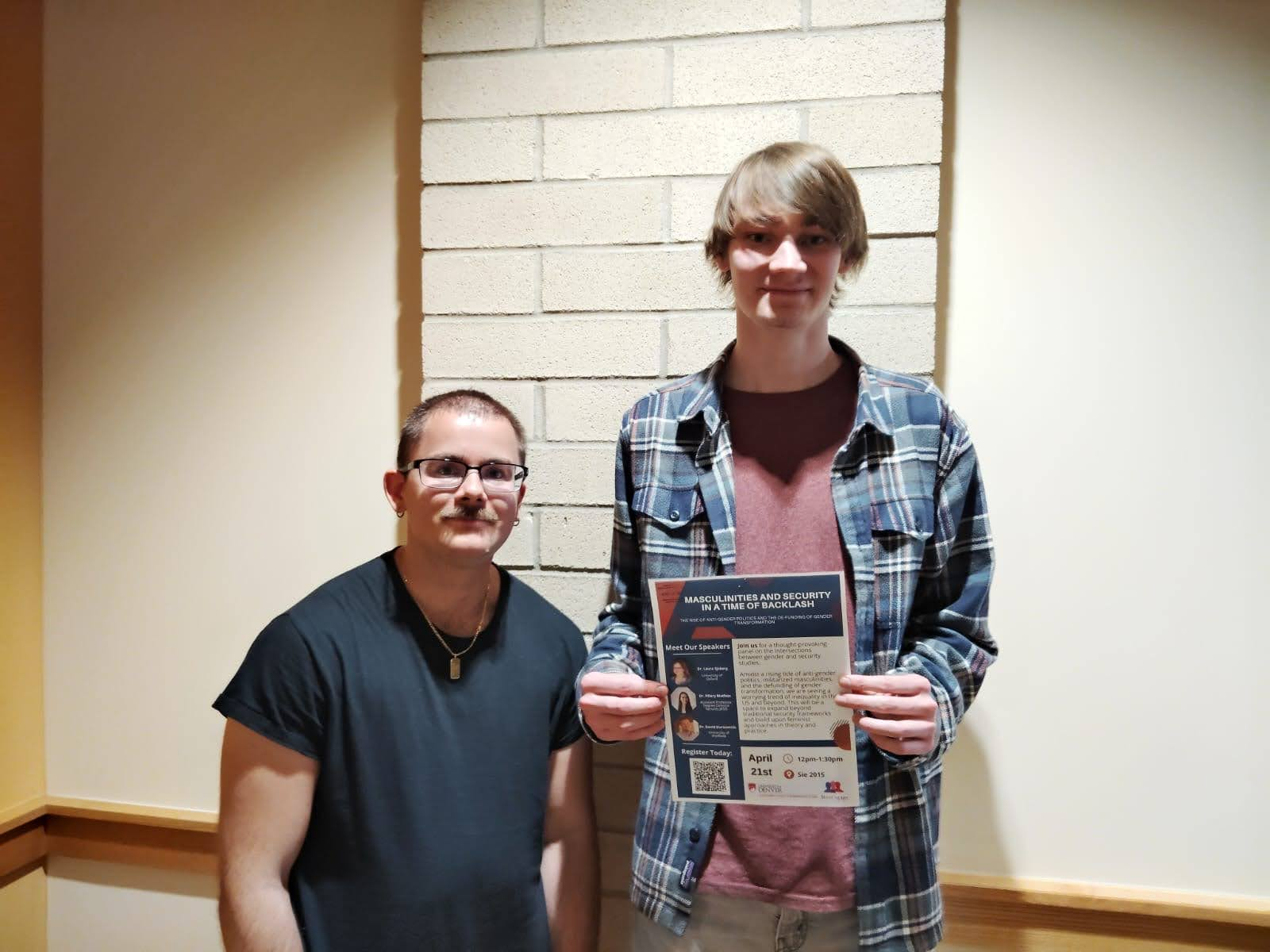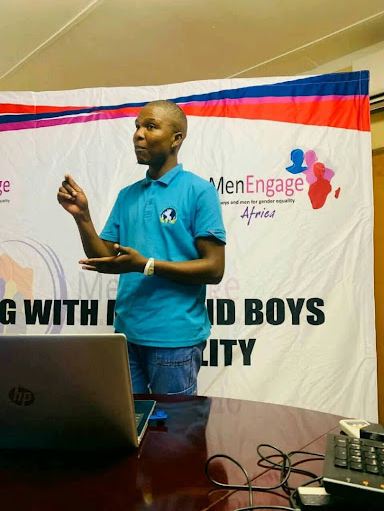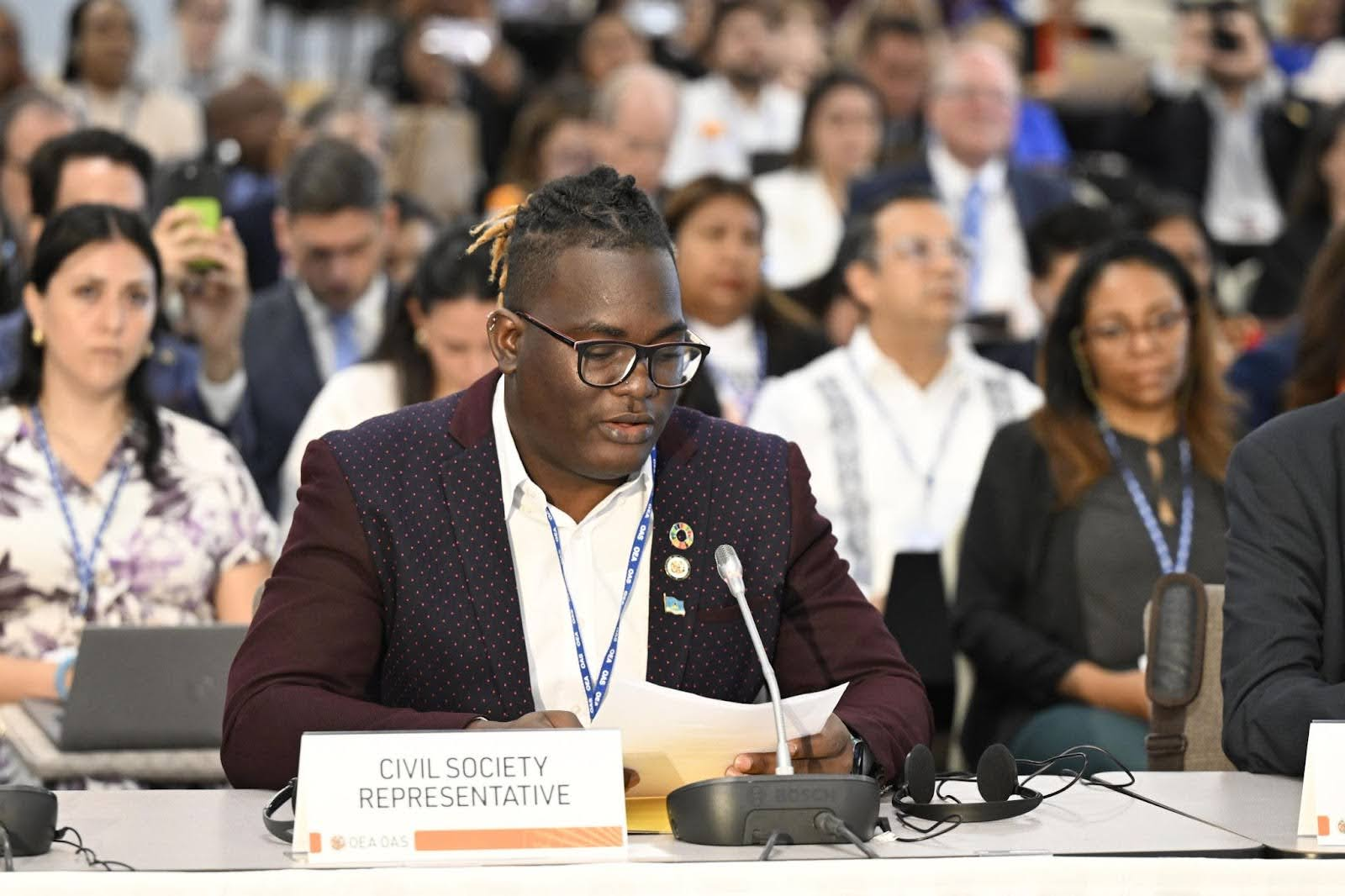We are the Shift: Youth at the Forefront of Gender Transformative Advocacy
- Published On
- 12 Aug 2025
- Published By
- Alex Nelson, Shalinee Bahadur
- Reading Time
- 7 minutes
- Resource Type
- Op-ed
Every year on August 12th, the world marks International Youth Day (IYD) as a time to celebrate and honour the power, creativity, and resilience of young people.
With the 2025 global theme set by the United Nations as ‘Local Youth Actions for the SDGs and Beyond’, youth leaders across MenEngage Alliance take this as a powerful opportunity to highlight what is possible when young people work to transform gender norms and patriarchal masculinities within their contexts, especially by integrating queer liberatory politics.
We will be sharing stories of change and impact from:
- Alex Nelson, MenEngage North America member, on how establishing the first-ever MenEngage student club in the 20+ years history of MenEngage is an opening up of possibilities of organising youth leadership and engagement.
- Gcina Shongwe, MenEngage Africa member, on how leading an LGBTQIA+ led organization is building inclusive, life-affirming masculinities and directly advancing the Sustainable Development Goals in Eswatini.
- Randall Theodule, Caribbean Male Action Network, on how blending art, activism, and pageantry is creating much needed safe spaces and challenging stigma for Trans and Gender Non-Conforming people in the Caribbean.
“We have the power to change how future generations will view masculinity”
Aidan Smith, President of the North America Men Engage (NAMEN) Chapter at the Joseph Korbel School of Global and Public Affairs at University of Denver, USA

From left to right: Alex Nelson & Aidan Smith
In 2024, Alex Nelson, a member of the MenEngage Alliance Global Youth Reference Group, proposed a novel idea for the first time in the 20+ history of MenEngage: a student-led North American MenEngage (NAMEN) Chapter within a tertiary institution.
As a network, the MenEngage Alliance network is organised through either an individual member or an organisation membership. This is why Alex’s proposal of establishing the NAMEN Chapter at the University of Denver’s Joseph Korbel School of Global and Public Affairs, was unprecedented and exciting. It allowed for youth-led leadership to emerge on a systematic level as a collective without being hindered by lengthy registration processes that an organisation might have to undergo.
In fact, Alex started the NAMEN Chapter because of his belief in the strength of collectives. He wanted to bring together students from diverse fields such as security studies, international human rights, and humanitarian development to engage in feminist advocacy. Through youth-led events like film screenings and plenary discussions, the Chapter creates peer-to-peer learning opportunities and trans-disciplinary knowledge development. One notable event, “Masculinities and Security in a Time of Backlash,” created space for students and feminist scholars to examine the interconnected rise of anti-gender politics and militarization.
For Alex, this work is deeply tied to the Sustainable Development Goals, as he says, “access to Quality Education (SDG 4) can advance Gender Equality (SDG 5), and vice versa, by equipping young people with the tools to advance gender justice, the chapter actively localizes the SDGs.”
Central to this effort is creating sustainable knowledge-sharing between peers and experts. As Alex graduated from Korbel, he passed the leadership of the Chapter to Aidan Smith, ensuring the continuity of youth leadership. Aidan was inspired to join through his own experiences with toxic masculinity in high school, particularly directed at the LGBTQ+ community. For him, the NAMEN Chapter offers a pathway to engage in dialogue and deepen his practice as an ally to the LGBTQ+ community, and for gender justice.
Moreover, the Chapter also serves as a platform for students to counter anti-feminist backlash with their unique perspectives as young people. When asked how youth can advance gender-transformative work in the face of regressive trends, Aidan reflected: “Youth are incredibly powerful in shaping societal attitudes and behaviors. We have the power to change how future generations will view masculinity, and we have a unique ability to influence how other people in our generation perceive it too.”
“We are reimagining and building new, inclusive and participatory ways of being.”
Gcina Shongwe, Programs Manager of United Youth for Sustainable Globe Eswatini

Gcina Shongwe, Programs Manager, United Youth for Sustainable Globe Eswatini
United Youth for Sustainable Globe (UYSG) Eswatini is a member organization of MenEngage Alliance Eswatini, Africa. UYSG serves as a powerful practice of how a youth-led and LGBTQIA+-led organization advocates for gender justice and sustainable development. Part of UYSG’s mission in transforming patriarchal masculinities includes not only dismantling harmful stereotypes but also creating inclusive, safe spaces for all youth.
UYSG Eswatini’s work is founded on the understanding that gender justice and patriarchal masculinities is not just a “women’s issue.” In fact, patriarchal masculinities harms everyone by pressuring young people, particularly LGBTQIA+ youth, to conform to rigid norms of heterosexuality severing all ties with their authentic selves. Patriarchal masculinities also promote and reward emotional suppression, aggressive and dominating behaviour. This leads to many men and boys feeling isolated and poor mental health, gender-based violence against women, girls, and LGBTQ+ people, and perpetuates stigma against men and boys who show center values of care, nurturance, and gender equality in their practice of what masculinity can be.
By creating space for “new, life-affirming masculinities,” UYSG shows how to embrace vulnerability, empathy, and equality, as both a personal and a political act of doing masculinity.
UYSG Eswatini’s success is rooted in its commitment to key practices that empower its community and drive systemic change.
- Authentic Youth-Led and LGBTQIA+-Led Governance: The organization’s leadership is composed of young people from the LGBTQIA+ community, ensuring that all programs and strategies are informed by the lived experiences of those they serve. This fosters a deep sense of ownership and relevance.
- Intersectional Approach to Sustainable Development: UYSG Eswatini embeds gender-transformative work directly into its efforts to achieve the SDGs, demonstrating how social justice is integral to sustainable development:
- SDG 5 (Gender Equality): UYSG designs peer education programs that directly challenge toxic masculinity, promoting a culture of consent and mutual respect among youth.
- SDG 3 (Good Health and Well-being): The organization creates community safe spaces where boys, young men, and non-binary youth can openly discuss mental health and sexuality in a supportive environment.
- SDG 16 (Peace, Justice, and Strong Institutions): UYSG’s advocacy efforts focus on pushing for inclusive laws and policies that protect all genders and sexual orientations from discrimination and violence.
- Building Solidarity and Countering Community Pushback: UYSG Eswatini actively counters the “anti-gender backlash” by forging strategic alliances across feminist, queer, and youth-led movements. They create intersectional spaces for reflection and strategy, reinforcing that struggles for gender justice, climate justice, and queer rights are interconnected.
- Innovative, Community-Driven Programs: A hallmark of UYSG’s approach is organizing intergenerational dialogues. These conversations bring together LGBTQIA+ youth, traditional leaders, and male allies to break down cycles of silence and stigma, fostering a deeper understanding and acceptance across generations.
“Real transformation is a journey, not a destination.”
Randall Theodule Caribbean Male Action Network (CARIMAN) member

Randall Theodule, social justice advocate
Randall Theodule’s advocacy with the Caribbean Male Action Network (CariMAN) demonstrates the power of meeting people where they are. A self-described “pageant lover, soca music enthusiast, and reality TV binger,” Randall uses a unique blend of activism and artistry, his work in Saint Lucia to challenge harmful norms and build community through culture, dialogue, and vibrant visibility.
A central project of this approach is “Transcendence,” an event held in 2023 and 2024 that created a crucial safe space for Trans and Gender Non-Conforming people to connect and share experiences. The initiative culminated in the “Transcendence Royale” pageant, which used performance and art to directly confront stigma, humanize a marginalized community, and celebrate diverse expressions of identity and talent.
Randall’s work is directly tied to several Sustainable Development Goals (SDGs), demonstrating how local actions contribute to global progress.
- SDG 5 (Gender Equality): This is the core of his work. Through an intersectional lens, he works to dismantle barriers to equality and ensure that everyone, regardless of their gender identity or sexual orientation, has equal access to opportunities, safety, and respect.
- SDG 10 (Reduced Inequalities): His advocacy and educational events directly address the systemic inequalities that affect LGBTQ+ people.
- SDG 16 (Peace, Justice, and Strong Institutions): By advocating for human rights and pushing for a society that protects all individuals from discrimination and violence, he contributes to creating more just and peaceful communities.
In the face of shrinking civic spaces and anti-rights backlash, Randall remains motivated by the communities he serves. Their resilience and determination inspire him to keep pushing. He emphasizes the importance of leaning into partnerships with other organizations and allies to create safe spaces for people to gather and support one another. By staying connected to the individuals whose lives his work impacts, he stays grounded and motivated.
Looking ahead, Randall aims to expand his work into regional and international collaborations to influence policy and social attitudes across the Caribbean and beyond, especially as many communities share similar cultural backgrounds and human rights challenges. A key part of his vision is the training of a new generation of activists to ensure the sustainability of the movement.
As Randall says, “real transformation is a journey, not a destination. It starts with one brave step in your own backyard, fueled by long nights and early mornings. In the face of challenges, let resilience, boldness, and courage be your guide, until everyone is treated with dignity and fairness.”
To learn more about Randall’s work you can follow him on X (_randiiee), Instagram (randiiee), and Facebook (Randall Theodule)
From Local Action to Global Impact: Join the Movement
In the face of a mounting global backlash — from anti-gender movements and shrinking civic space to normalized violence and politicized religion — the gender justice movement is under unprecedented threat. Yet, amidst these challenges, young people are demonstrating extraordinary resilience and boldness. The actions we take in our homes, schools, communities and online platforms may seem small, but together, they are part of a powerful global shift.
We are not giving up. We are pushing back, pushing forward, and pushing boundaries.
We envision a world where patriarchal masculinities are transformed into caring, non-violent ones, where men and boys are active agents of change, and where gender-diverse people and feminists are empowered to thrive.
We call on young people everywhere to act boldly. Whether you are:
- starting a school club to talk about emotions,
- advocating for gender transformative policy
- Mobilizing your community to take climate justice seriously
- Using your art to challenge gender stereotypes
This is what feminist youth leadership looks like: building intergenerational bridges, sharing power, and transforming personal pain into a political force for community care and global impact.
This article was compiled by Shalinee Bahadur and Alex Nelson as part of a larger series of activities for International Youth Day 2025, led by the MenEngage Global Youth Reference Group.

